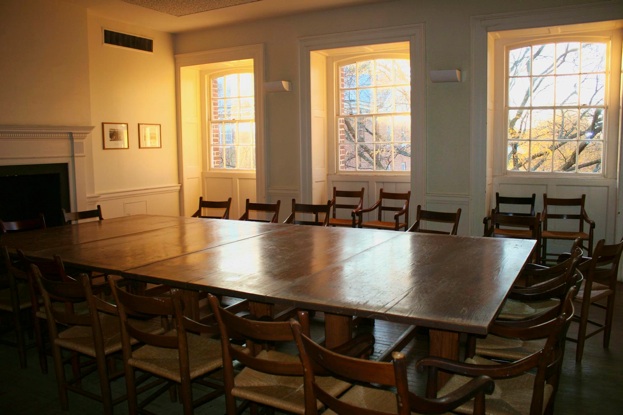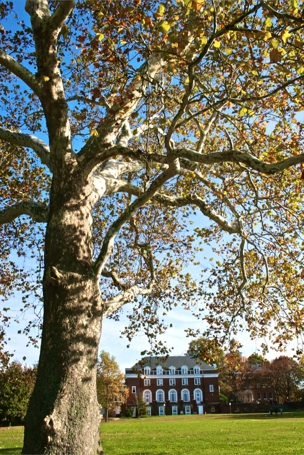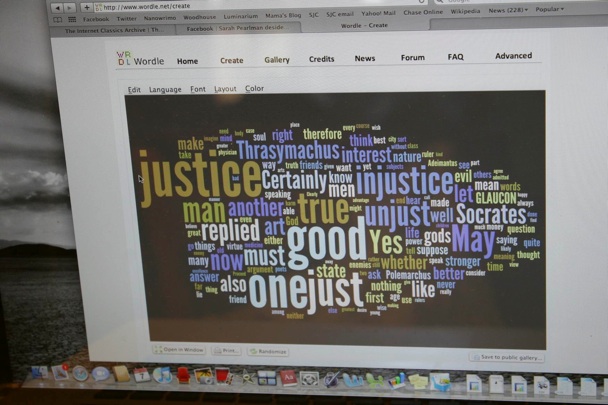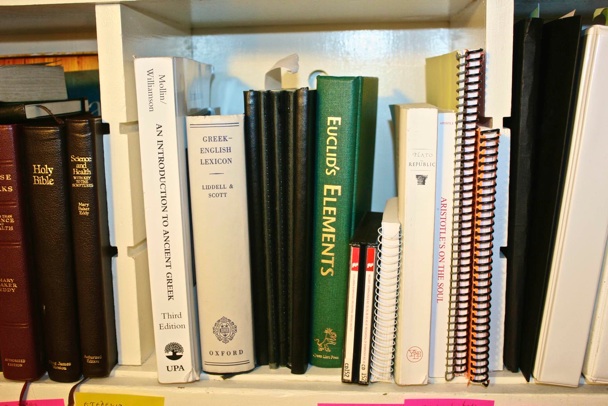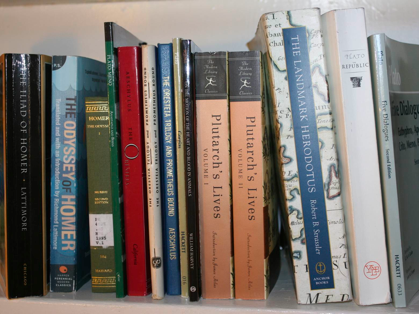
The parents were given the homework of reading Plato’s Apology, which is his account of Socrates’ defense at his trial. (Apologia in Greek means defense, not to say you are sorry…) The parents then, on Saturday morning of Parent’s Weekend had our own seminar on this reading to experience what it is like for our sons and daughters. (Later in the afternoon, we would do the same and discuss Euclid like they might.) The photo above shows the works our daughter has already completed in this way in her first two months at this college. Quite daunting, I think, when you see the level of rich intensity on each and every page. (Those books do not include those for math, science and Ancient Greek classes, whose texts are shown at the bottom.)
I enjoyed the reading and discussion; it not only highlighted the value of the incredible education my daughter is receiving, but I understood better what “major” she will really graduate with. I realized everyone here actually graduates with a degree in “Thinking” in a way I have never witnessed before. You are never told what to think but need to figure it out for yourself and the style of the seminar process makes this not only possible but imperative and memorable as well. These students learn how to think as well as come to know what they think themselves as sourced from a profusion of the greatest thinkers that ever lived. So I was grateful for this seminar exercise for facilitating this understanding and insight, but I also enjoyed for its own sake, relishing a glimmer of contemplating this content for myself as well.
So here is a sample of what we very respectfully and thoughtfully discussed: What kind of life is worth living? What is justice and can you approach it by simply trying to remove injustice? Did Socrates choose martyrdom to further his cause? Was he egotistical and selfishly self serving, or were his motives the highest and most pure? Why did he not have his supporters testify in his defense, and only challenge his detractors instead? Is knowing what you don’t know equivalent with wisdom? What is the danger in thinking we know more than we actually do? (Am I admitting more than I actually know?) Can you build others up without tearing them down a bit? Can you correct people without annoying them? Was he a menace to society and leading the young ones astray by his questioning? Is that punishable by death? Do we like our illusive status quo so much that we will eliminate any effort to wake us up? Why did he meet death cheerfully and what did that do for him?
Here are my favorite bits from the text:
“‘I am wiser than this man; it is likely that neither of us knows anything worthwhile, but he thinks he knows something when he does not, whereas when I do not know, neither do I think I know; so I am likely to be wiser than he to this small extent, that I do not think I know what I do not know.’”
“I found that those of the highest reputation were nearly the most deficient, while those who were thought to be inferior were more knowledgeable.”
“…you are not ashamed of your eagerness to possess as much wealth, reputation, and honors as possible, while you do not care for nor give thought to wisdom or truth, or the best possible state of your soul?”
“‘Wealth does not bring about excellence, but excellence makes wealth and everything else good for men, both individually and collectively.’”
“A man who really fights for justice must lead a private, not a public, life if he is to survive for even a short time.”
“…what do I deserve to suffer or to pay because I have deliberately not led a quiet life but have neglected what occupies most people: wealth, household affairs, the position of general or public orator or the other offices, the political clubs and factions that exist in the city? I thought myself too honest to survive if I occupied myself with those things.”
“…since I am convinced that I wrong no one, I am not likely to wrong myself…”
“…the unexamined life is not worth living…”
“You are wrong if you believe that by killing people you will prevent anyone from reproaching you for not living in the right way.”
“…there is good hope that death is a blessing, for it is one of two things: either the dead are nothing and have no perception of anything, or it is, as we are told, a change and a relocating for the soul from here to another place. If it is complete lack of perception, like a dreamless sleep, than death would be a great advantage…. If, on the other hand, death is a change to another place, and what we are told is true and all who have died are there, what greater blessing could there be…? … It would be an extraordinary happiness to talk with them, to keep company with them and examine them.”
“…keep this one truth in mind, that a good man cannot be harmed either in life or in death, and that his affairs are not neglected by the gods.”
